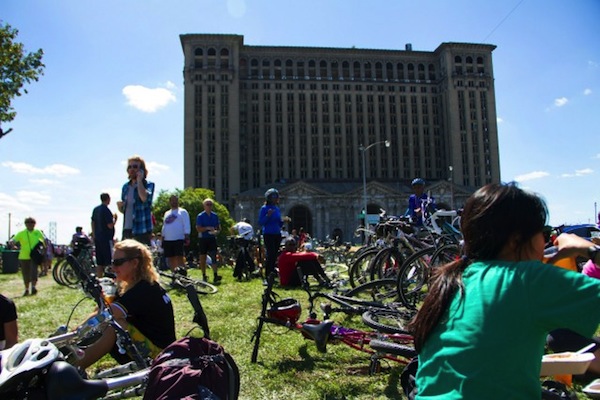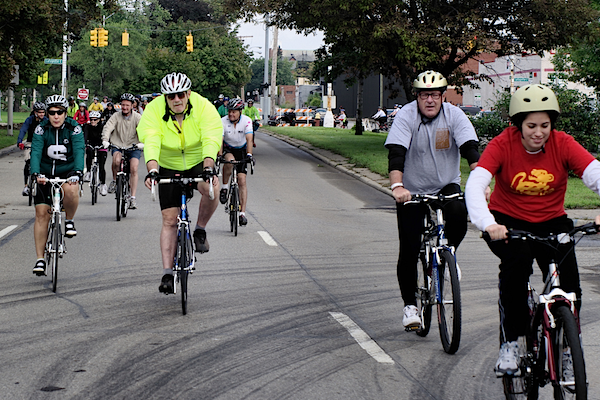Tour de Troit: Much more than a big bike ride
A dozen years after forming, the Tour de Troit has evolved from a small, leisurely group ride into an annual juggernaut attracting over 5,000 cyclists. Nina Ignaczak recaps the history and looks ahead as the organization forms a nonprofit to fund greenways.
In 2001, Hamtramck resident Mike Kiewicz’s truck broke down.
Forced to find another way to work, Kiewicz dug out his old bicycle and began riding the 15 miles to and from his job.
“I realized, hey, this is doable, it’s only 15 miles, and I’m getting 30 miles worth of exercise every day,” Kiewicz says.
The following year, Kiewicz and a friend decided to travel to New York City to participate in the Five Boro Ride, an annual 40-mile, car-free ride through the five boroughs attracting over 32,000 cyclists.
A first-time visitor to the Big Apple, Kiewicz found the ride to be a great way to experience the city.
“It’s a different vibe. You are more in tune with your surroundings, you’re not cloistered in a car,” says Kiewicz. “I started thinking, ‘why couldn’t we do this back home?'”
So in the summer of 2002, Kiewicz enlisted friend Ed Potas to plan what would become the first Tour de Troit. Kiewicz was able to secure a city police escort free-of-charge (the department used the event as a motorcade training exercise), and the two set about papering bike shops with fliers.
As Kiewicz recalls, local media weren’t exactly enthused about promoting it.
“I couldn’t get the press to touch it,” Kiewicz says.
That first ride attracted about 40 people for a 38-mile ride through the city. The following year doubled participation, and the third year doubled again. At that point Kiewicz moved to Ohio for a new job. When he returned four years later for the 2008 ride, over 1,000 people rode along.
Organizers expect 5500 people from all over the metro region and Windsor to participate next week at the twelfth annual Tour de Troit ride on Saturday, Sept. 21. The ride will feature a closed route with a City of Detroit police escort.
Francophiles can pronounce the name properly as two-er-day-twah, but it is also acceptable to pronounce it two-er-de-troyt, according to organizer Kelli Kavanaugh.
Kavanaugh prefers the English pronunciation.
“I have a terrible French accent,” she says.
This year, Tour de Troit began operating as an official 501(c) 3 nonprofit. Kavanaugh co-directs the organization with Vittoria Katanski. A nine-member board of directors, chaired by Bil Lusa, oversees the organization.
The group decided to organize as a nonprofit to better manage the large event and several newer spin-off events throughout the year. The events celebrate various aspects of Detroit’s heritage, including the MLK Memorial Ride in January which follows the 1963 March to Freedom route; the Hamtramck Paczki Run on Fat Tuesday which honors Hamtramck’s Polish heritage; the Run du Nain Rouge on the Sunday after the Vernal Equinox celebrating the folklore of Detroit’s original devil; and Cycle into Spring in May which celebrates spring. Proceeds from the events support non-motorized transportation infrastructure planning and design in the City of Detroit.
“Several of us were resistant (to becoming a nonprofit) because there are so many nonprofits here in Detroit competing for funds and attention,” says Kavanaugh. “But at some point, this thing became a beast of its own. It needed its own board and it’s own direction.”
Prior to incorporating, organizers partnered with local community development corporations for fiduciary services, and relied on volunteers to manage operations. Volunteers are still critical to the success of the ride; over 450 volunteers help out with the Tour de Troit every year.
Steve Roach is an attorney with Miller Canfield, a lead sponsor of the Tour de Troit since 2007. The firm also donates legal services to the organization.
“We see (supporting the Tour de Troit) as fitting a couple missions our firm has; to promote the City of Detroit as being a livable place and to promote a healthy, vibrant lifestyle,” says Roach, who often rides eight miles each way to his downtown office from Grosse Pointe Park. Roach is also on Tour de Troit’s board of directors.
Between 2005 and 2010, the Tour de Troit raised over $120,000 for the planning and design of the over 16-mile Southwest Detroit Greenlink (referred to today as the Corktown-Mexicantown Greenlink).
“The Tour de Troit played a big role in funding the design efforts, and really kept the excitement level high so that the project could keep going and get implemented,” says Mike Darga, and engineer with Giffels Webster who worked on the project. “It’s made a huge difference in Southwest and Corktown, and along the riverfront. It’s really connected the community together, and it’s made a huge difference to the population without access to cars.”
In 2011, Tour de Troit raised $20,000 for a citywide way-finding project that will begin in 2014. In 2012, another $7500 was raised for the Villages Community Development Corporation‘s GREEN Task Force Vision of Greenways for the Lower Eastside.
Brian Hurtienne, Executive Director of the Villages CDC and member of Tour de Troit’s board of directors, is glad to see the organization expand its reach as a nonprofit.
“Knowing how the Tour de Troit was so successful, why not make it into something even more successful,” he says. “The funds will go for maintenance of the greenways and non-motorized transportation routes, way-finding, designation, and implementing.”
In 2013, the Tour de Troit raised $3,000 at the Paczki Run for City of Hamtramck’s 25-mile greenway plan. Another $2,500 was raised at Cycle into Spring for the Detroit Eastside Community Collaborative’s Conner Creek Greenway program.
“Tour de Troit becoming a nonprofit certainly fills a void in the city in terms of an organization that can hold successful events and fundraise for non-motorized transportation in Detroit,” says Todd Scott, Detroit Greenways coordinator with the Michigan Trails and Greenways Alliance. Scott is also on Tour de Troit’s board of directors.
“Throughout the years, in part because of this event, biking in Detroit is now seen as a great thing, as it should be,” says Scott.
Next Saturday, Kiewicz will make the trek up from Ohio for the twelfth annual ride.
“I don’t miss it for anything,” he says. “To see what it’s become, you can’t wipe the smile off my face.”







